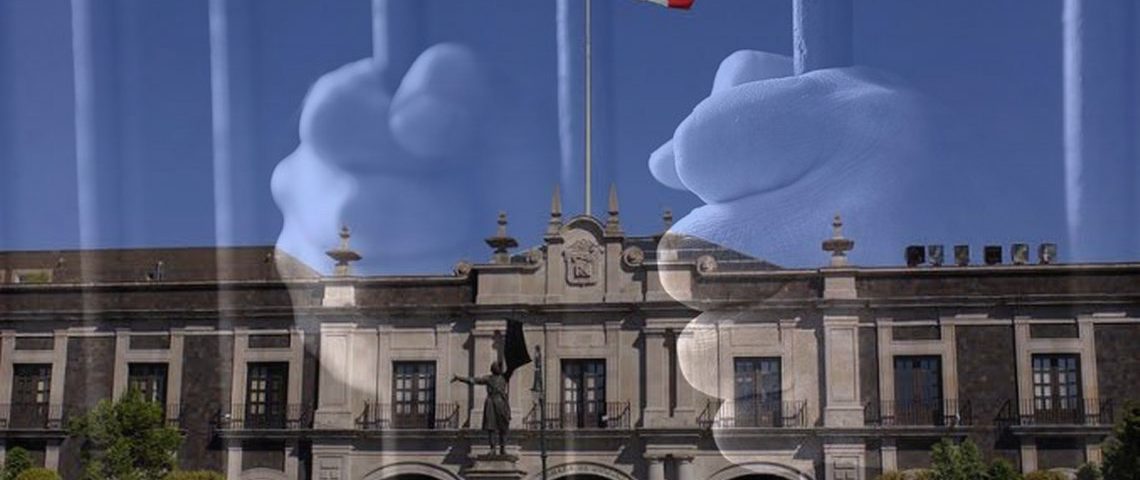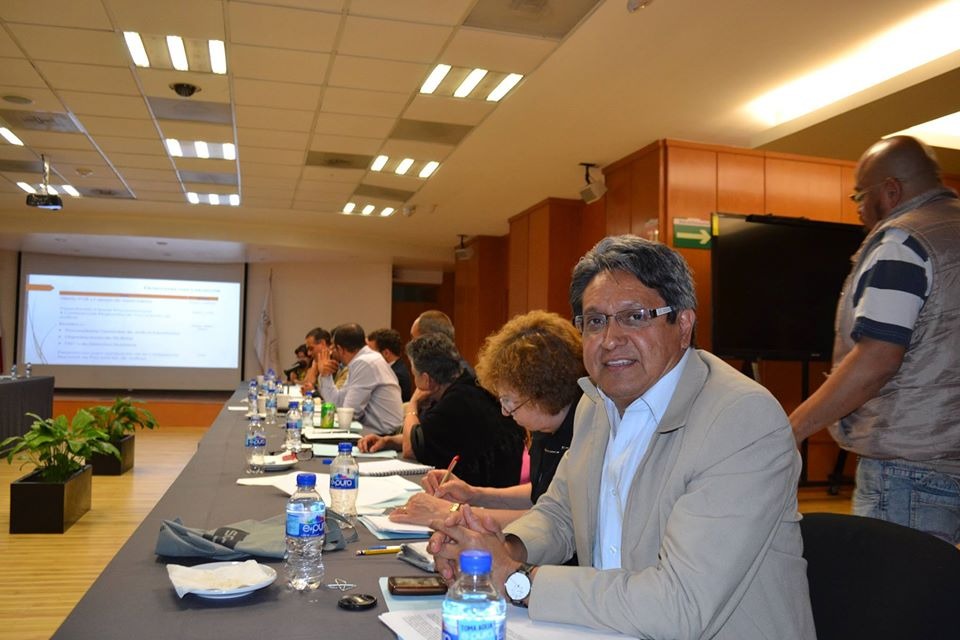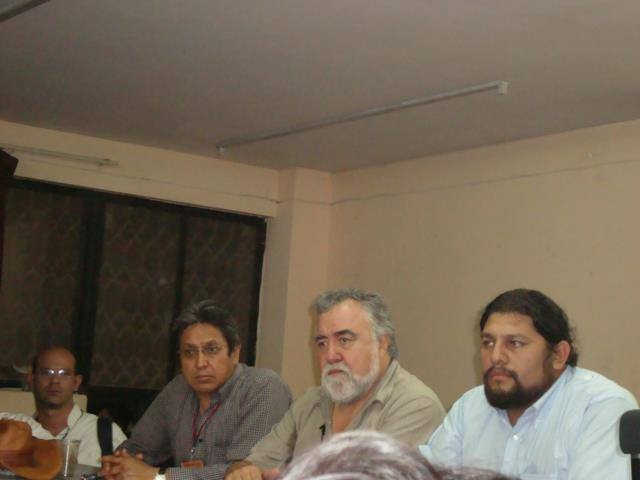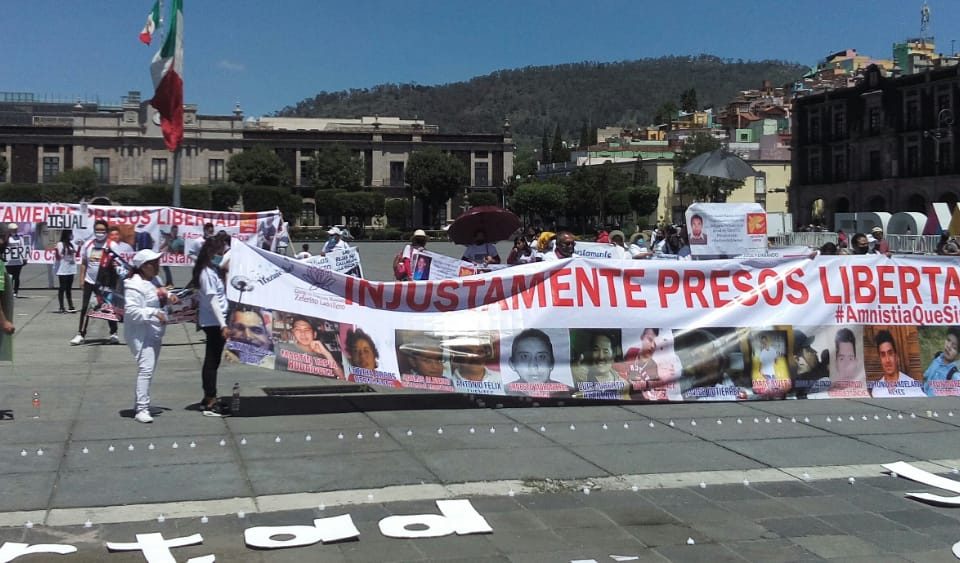
Facets of Mexico
May 29, 2020
In the IEEM program is exhibited “Risks of the pandemic COVID-19 on democracy in Latin America”
June 4, 2020Initiative for Amnesty Law in Edomex is incomplete, it does not consider “false guilty”

HIGHLIGHTS
Initiative for Amnesty Law in Edomex is incomplete, it does not consider “false guilty”


June 2nd, 2020
The president of the Mexican League for the Defense of Human Rights (LIMEDDH), Adrián Ramírez, considered that the Amnesty Laws that are enlisted in the states of the country, including Edomex, will hardly have the scope that is required to guarantee that people deprived of their liberty through the manufacture of crimes, media trials, corruption of the judicial, police and military systems, or under influence peddling, can obtain justice since the legislative projects under study are not taking into account these provisions.
According to the head of the LIMEDDH, these are thousands of people who under 30 years of neoliberalism operated as a balancing mechanism to sustain a narco-state-police-military, which, at the rate of committing crimes, was making guilty parties, since in this way it was justified - pretending efficiency - and it supported a complex system of corruption of great scope.
This without considering that the support of large prison populations also operates as a system in which large sums of public money are invested.
In an interview with The Observer, Periodismo y Verificador del Discurso Público, the expert on issues of Human Rights, justice and prison systems, warned that the initiatives to generate amnesty laws in the entities and the State of Mexico are falling short because we are dealing with a system that for several decades, but with greater intensity in the last 20 years at Edomex, was dedicated to practically one thing: "manufacturing culprits".
In this sense, and considering that the initiative of the law promoted by the Morena legislature in the 60th Local Legislature proposes to grant amnesty, but only for those who incurred in minor, prime criminal offenses and for those who, due to their economic conditions, were unable to pay for justice –in synthesis-, the head of the LIMEDDH assured that this and other projects will be insufficient since they do not respond to the reality that led the country to fill its prisons with innocent people.
It should be noted that currently, the 22 penitentiary centers of the State of Mexico are overcrowded, with a population of around 30 thousand people and with preventive centers, such as the Neza-Bordo prison and the Barrientos de Tlalnepantla prison, whose quota is around 200% or more in some cases.
Interviewed on the legislative project of the Local Congress of the State of Mexico to issue an Amnesty Law, in response to its federal counterpart, the president of LIMEDDH outlined the complexities faced by these projects and their limited scope to cover those who really need to be amnestied and that they have spent 20 years or more without receiving a sentence, as a result of the complex system of corruption for which they were caught for crimes they did not commit.
In this interview, Adrián Ramirez summarizes the genesis that shaped the justice and judicial systems, which ended up setting up the apartment to mass-produce guilty parties and hold them there unjustly. But it also addresses what are the other alternatives that, parallel to these Amnesty Law projects in the entities, could respond to this enormous need for justice and that there are basically two: a Restitutive Penal Reform and Negotiation Tables in the states, similar to those set up by SEGOB, to review “case by case”.
At the beginning and to open the subject, Adrian Ramírez warns that the Federal Law against Organized Crime and other special laws and jurisprudence, under which the victims of the neoliberal system and narco-state of the past six-year periods, must continue to seek penalties for crimes that never committed.
In this interview, Adrián Ramirez summarizes the genesis that shaped the justice and judicial systems, which ended up setting up the apartment to mass-produce guilty parties and hold them there unjustly; But it also addresses what are the other alternatives that, parallel to these Amnesty Law projects in the entities, could respond to this enormous need for justice and that there are basically two: a Restitutive Penal Reform and Negotiation Tables in the states, similar to those set up by SEGOB, to review “case by case”.
At the beginning and to open the subject, Adrian Ramírez warns that the Federal Law against Organized Crime and other special laws and jurisprudence, under which the victims of the neoliberal system and narco-state of the past six-year periods, must continue to seek penalties for crimes that never committed.
The interview.
-In the State of Mexico was the initiative to create an Amnesty Law presented. However, people who are in prisons for fabricated crimes are not being considered. How are these laws going to face this problem?
The first point is that the penal system has been terribly distorted to fundamentally promote corruption, influence peddling, and to have a captive population that is forced or induced to consume drugs to join criminal groups, to commit crimes under threat and well-founded fear of harming them or their family members. In other societies, these people either would not have touched the prison or would already be free with all the modalities that the justice system considers, in order to fundamentally move towards allowing the reparation of damages to victims in crimes that do not see the prison. Also substitute prison terms are strengthened and favored, since keeping people in prison is a bottomless barrel in which the treasury money goes without achieving the committed to provide security, nor does it deter crime so that it is inhibited from committing illegal acts.
Now we have 30 years with the imposition of a model that came through judicial fraud, torture, the induction of witnesses and spectacular media campaigns, to bring to prison a number of people who were fabricated crimes and fundamentally, these 30 years of neoliberalism. From this millennium, especially with the arrival of Genaro García Luna, there were a very large number of people who were deprived of their liberty and remain in prison, since as long as the Federal Law Against the Organized Crime, there can be no Amnesty Law that can set them free since from the outset the crimes of Organized Crime are highly criticized and worry public opinion.
In other words, when we talk about Organized Crime, a very serious situation is immediately reflected in people's minds. Although this is not the case, a “narco-military police state” was imposed, in which the State committed crimes and manufactured criminals. In order to maintain that complexity of being a "narco-military police state", it would have to give results and therefore crimes were manufactured and that is what is not going to allow them to be released with these amnesty laws, no matter how benevolent they may be. That is why we look at the amnesty laws with good eyes, but we understand that it is insufficient and therefore we speak for the abolition of special laws, such as the Federal Law against Organized Crime and the system of Jurisprudences that they allowed this law at the state level and its correlates in the different states.
That is fundamental, but above all that the citizens understand that the prejudice of having seen impressive scenes, where apparently a criminal confesses before the cameras and in an almost cynical way having committed crimes in a video when he has not even been presented to the ministerial authority. That is, through the torture he was forced to make those videos, and television allowed us to believe that this was happening. I understand that one of the darkest times in Mexico State was that of Navarrete Prida, and others such as Bazbaz, the famous of "the hiding places with the girl Paulette, and Miguel Ángel Contreras Nieto, but even he was seen giving instructions to torture a person and Nieto was a member of the Human Rights State Commission. Moreover, with all the authorizations that Montiel gave during his government, even when he was the one who said, "Human Rights were for humans not for rats". He gave political justification by denying rights, manufacturing crimes, and doing all those mounts. We already have many people who have been 20 years in prison and have not come out despite the fact the legal files are full of irregularities, this is where you can demonstrate what we have mentioned; torture, induction of witnesses, media montages, corrupting effect and all that model of injustice. -Doctor, then, from the outset, any attempt, no matter how good intentions there are, both in the states and in Edomex, will it be difficult for that amnesty law to work for those thousands of innocents in prisons? Take into account that we have a population between more than 200 thousand and less than 300 thousand people in prison throughout the country, in-state centers, Ceresos and juvenile justice. Then, with the Amnesty laws being very kind, we will be seeing the freedom of between 4 thousand and 10 thousand people, the majority of whom are indigenous and very poor, who are in prison because they did not have money to pay for justice as well. -Is this around 10%? This represents about 2 to 5%. -Is there any other way or mechanism that you see to achieve the release of so many innocent people who are in jails? -Well, there are two more ways. One that we could see ... we are proposing the "Restorative Penal Reform", and in it, the bet is that the maximum penalties are 20 years commutable to 10 years. Therefore, many people who were already over 20 years old are could be freed and those who were sentenced to 20 could review their cases and could go out in 10 years, that way the number of people who could go free would go up a lot. Another model is through negotiation on a case-by-case basis, as carried out by the SEGOB table, but it is slow. For example, in the case of political prisoners, we have not reached 60 since the government of Andrés Manuel and limited as well as requiring another model and there is another important model that is the jurisprudential part.
In other words, the Supreme Court of Justice, the Judges and Magistrates, would have to dictate new jurisprudence regarding, for example, the subject of torture, regarding media assemblies, regarding the induction of witnesses, regarding the absence of the formalities of the right to "due process", because something that greatly delays the freedom of people are the so-called "amparos for effects". -What are these amparos, to replace procedures, right? -Yes, in the amparos for effects they say ... well, there are flagrant irregularities, this test was not carried out or something was not taken into account and therefore instead of ruling in favor of the person requesting the protection of the justice, they return it to the judge of origin so that it can be perfected or remedied. Apparently, those irregularities that were committed at the time of sentencing without taking care of some elements of the right to due process. This delays many cases and greatly limits freedom.
It is then necessary to work a little more on that point, and the other is the firm and clear declaration of all the organs of the governments, state, federal and municipal. So that it helps to influence the media regarding the recognition that justice in Mexico has passed into momentous penalties ... that is, it does not respect what deprivation of liberty means. Virtually no prison guarantees the application of the Mandela Rules, nor the Tokyo Rules, and therefore must help so that the population does not stigmatize those who are in prison and that they help them to have a healthy coexistence and they rejoin being productive ...
Staff
Translator: Martín Caballero
The president of the Mexican League for the Defense of Human Rights (LIMEDDH), Adrián Ramírez, considered that the Amnesty Laws that are enlisted in the states of the country, including Edomex, will hardly have the scope that is required to guarantee that people deprived of their liberty through the manufacture of crimes, media trials, corruption of the judicial, police and military systems, or under influence peddling, can obtain justice since the legislative projects under study are not taking into account these provisions.
According to the head of the LIMEDDH, these are thousands of people who under 30 years of neoliberalism operated as a balancing mechanism to sustain a narco-state-police-military, which, at the rate of committing crimes, was making guilty parties, since in this way it was justified - pretending efficiency - and it supported a complex system of corruption of great scope.
This without considering that the support of large prison populations also operates as a system in which large sums of public money are invested.
In an interview with The Observer, Periodismo y Verificador del Discurso Público, the expert on issues of Human Rights, justice and prison systems, warned that the initiatives to generate amnesty laws in the entities and the State of Mexico are falling short because we are dealing with a system that for several decades, but with greater intensity in the last 20 years at Edomex, was dedicated to practically one thing: "manufacturing culprits".
In this sense, and considering that the initiative of the law promoted by the Morena legislature in the 60th Local Legislature proposes to grant amnesty, but only for those who incurred in minor, prime criminal offenses and for those who, due to their economic conditions, were unable to pay for justice –in synthesis-, the head of the LIMEDDH assured that this and other projects will be insufficient since they do not respond to the reality that led the country to fill its prisons with innocent people.
It should be noted that currently, the 22 penitentiary centers of the State of Mexico are overcrowded, with a population of around 30 thousand people and with preventive centers, such as the Neza-Bordo prison and the Barrientos de Tlalnepantla prison, whose quota is around 200% or more in some cases.
Interviewed on the legislative project of the Local Congress of the State of Mexico to issue an Amnesty Law, in response to its federal counterpart, the president of LIMEDDH outlined the complexities faced by these projects and their limited scope to cover those who really need to be amnestied and that they have spent 20 years or more without receiving a sentence, as a result of the complex system of corruption for which they were caught for crimes they did not commit.
In this interview, Adrián Ramirez summarizes the genesis that shaped the justice and judicial systems, which ended up setting up the apartment to mass-produce guilty parties and hold them there unjustly. But it also addresses what are the other alternatives that, parallel to these Amnesty Law projects in the entities, could respond to this enormous need for justice and that there are basically two: a Restitutive Penal Reform and Negotiation Tables in the states, similar to those set up by SEGOB, to review “case by case”.
At the beginning and to open the subject, Adrian Ramírez warns that the Federal Law against Organized Crime and other special laws and jurisprudence, under which the victims of the neoliberal system and narco-state of the past six-year periods, must continue to seek penalties for crimes that never committed.
In this interview, Adrián Ramirez summarizes the genesis that shaped the justice and judicial systems, which ended up setting up the apartment to mass-produce guilty parties and hold them there unjustly; But it also addresses what are the other alternatives that, parallel to these Amnesty Law projects in the entities, could respond to this enormous need for justice and that there are basically two: a Restitutive Penal Reform and Negotiation Tables in the states, similar to those set up by SEGOB, to review “case by case”.
At the beginning and to open the subject, Adrian Ramírez warns that the Federal Law against Organized Crime and other special laws and jurisprudence, under which the victims of the neoliberal system and narco-state of the past six-year periods, must continue to seek penalties for crimes that never committed.
The interview.
-In the State of Mexico was the initiative to create an Amnesty Law presented. However, people who are in prisons for fabricated crimes are not being considered. How are these laws going to face this problem?
The first point is that the penal system has been terribly distorted to fundamentally promote corruption, influence peddling, and to have a captive population that is forced or induced to consume drugs to join criminal groups, to commit crimes under threat and well-founded fear of harming them or their family members. In other societies, these people either would not have touched the prison or would already be free with all the modalities that the justice system considers, in order to fundamentally move towards allowing the reparation of damages to victims in crimes that do not see the prison. Also substitute prison terms are strengthened and favored, since keeping people in prison is a bottomless barrel in which the treasury money goes without achieving the committed to provide security, nor does it deter crime so that it is inhibited from committing illegal acts.
Now we have 30 years with the imposition of a model that came through judicial fraud, torture, the induction of witnesses and spectacular media campaigns, to bring to prison a number of people who were fabricated crimes and fundamentally, these 30 years of neoliberalism. From this millennium, especially with the arrival of Genaro García Luna, there were a very large number of people who were deprived of their liberty and remain in prison, since as long as the Federal Law Against the Organized Crime, there can be no Amnesty Law that can set them free since from the outset the crimes of Organized Crime are highly criticized and worry public opinion.
In other words, when we talk about Organized Crime, a very serious situation is immediately reflected in people's minds. Although this is not the case, a “narco-military police state” was imposed, in which the State committed crimes and manufactured criminals. In order to maintain that complexity of being a "narco-military police state", it would have to give results and therefore crimes were manufactured and that is what is not going to allow them to be released with these amnesty laws, no matter how benevolent they may be. That is why we look at the amnesty laws with good eyes, but we understand that it is insufficient and therefore we speak for the abolition of special laws, such as the Federal Law against Organized Crime and the system of Jurisprudences that they allowed this law at the state level and its correlates in the different states.
That is fundamental, but above all that the citizens understand that the prejudice of having seen impressive scenes, where apparently a criminal confesses before the cameras and in an almost cynical way having committed crimes in a video when he has not even been presented to the ministerial authority. That is, through the torture he was forced to make those videos, and television allowed us to believe that this was happening. I understand that one of the darkest times in Mexico State was that of Navarrete Prida, and others such as Bazbaz, the famous of "the hiding places with the girl Paulette, and Miguel Ángel Contreras Nieto, but even he was seen giving instructions to torture a person and Nieto was a member of the Human Rights State Commission. Moreover, with all the authorizations that Montiel gave during his government, even when he was the one who said, "Human Rights were for humans not for rats". He gave political justification by denying rights, manufacturing crimes, and doing all those mounts. We already have many people who have been 20 years in prison and have not come out despite the fact the legal files are full of irregularities, this is where you can demonstrate what we have mentioned; torture, induction of witnesses, media montages, corrupting effect and all that model of injustice. -Doctor, then, from the outset, any attempt, no matter how good intentions there are, both in the states and in Edomex, will it be difficult for that amnesty law to work for those thousands of innocents in prisons? Take into account that we have a population between more than 200 thousand and less than 300 thousand people in prison throughout the country, in-state centers, Ceresos and juvenile justice. Then, with the Amnesty laws being very kind, we will be seeing the freedom of between 4 thousand and 10 thousand people, the majority of whom are indigenous and very poor, who are in prison because they did not have money to pay for justice as well. -Is this around 10%? This represents about 2 to 5%. -Is there any other way or mechanism that you see to achieve the release of so many innocent people who are in jails? -Well, there are two more ways. One that we could see ... we are proposing the "Restorative Penal Reform", and in it, the bet is that the maximum penalties are 20 years commutable to 10 years. Therefore, many people who were already over 20 years old are could be freed and those who were sentenced to 20 could review their cases and could go out in 10 years, that way the number of people who could go free would go up a lot. Another model is through negotiation on a case-by-case basis, as carried out by the SEGOB table, but it is slow. For example, in the case of political prisoners, we have not reached 60 since the government of Andrés Manuel and limited as well as requiring another model and there is another important model that is the jurisprudential part.
In other words, the Supreme Court of Justice, the Judges and Magistrates, would have to dictate new jurisprudence regarding, for example, the subject of torture, regarding media assemblies, regarding the induction of witnesses, regarding the absence of the formalities of the right to "due process", because something that greatly delays the freedom of people are the so-called "amparos for effects". -What are these amparos, to replace procedures, right? -Yes, in the amparos for effects they say ... well, there are flagrant irregularities, this test was not carried out or something was not taken into account and therefore instead of ruling in favor of the person requesting the protection of the justice, they return it to the judge of origin so that it can be perfected or remedied. Apparently, those irregularities that were committed at the time of sentencing without taking care of some elements of the right to due process. This delays many cases and greatly limits freedom.
It is then necessary to work a little more on that point, and the other is the firm and clear declaration of all the organs of the governments, state, federal and municipal. So that it helps to influence the media regarding the recognition that justice in Mexico has passed into momentous penalties ... that is, it does not respect what deprivation of liberty means. Virtually no prison guarantees the application of the Mandela Rules, nor the Tokyo Rules, and therefore must help so that the population does not stigmatize those who are in prison and that they help them to have a healthy coexistence and they rejoin being productive ...
Staff
Translator: Martín Caballero





